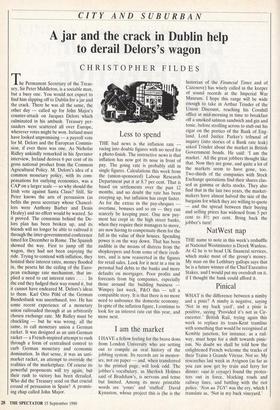CITY AND SUBURBAN
A jar and the crack in Dublin help to derail Delors's wagon
CHRISTOPHER FILDES
he Permanent Secretary of the Treas- ury, Sir Peter Middleton, is a sociable man,
but a busy one. You would not expect to find him slipping off to Dublin for a jar and the crack. There he was all the same, the other day — called up for John Major's counter-attack on Jacques Delors which culminated in his ambush. Treasury per- suaders were scattered all over Europe, wherever votes might be won. Ireland must have looked unpromising — a payroll vote
for M. Delors and the European Commis- sion, if ever there was one. As Nicholas Ridley unkindly remarked in his Spectator interview, Ireland derives 6 per cent of its gross national product from the Common Agricultural Policy. M. Delors's idea of a common monetary policy, with its com- pensations for outlying economies, was a CAP on a larger scale — so why should the Irish vote against Santa Claus? Still, Sir Peter knows the arts of persuasion (as befits the press secretary whose Chancel- lors were Anthony Barber and Denis Healey) and no effort would be wasted. So it proved. The consensus behind the De- lors plan has been broken up, and its friends will no longer be able to railroad it through the inter-governmental conference timed for December in Rome. The Spanish showed the way. First to jump off the wagon, they had not been enjoying the ride. Trying to contend with inflation, they hoisted their interest rates, money flooded in, the peseta hit the ceiling of the Euro- pean exchange rate mechanism, that im- plied a need to cut interest rates . . . . In the end they fudged their way round it, but it cannot have endeared M. Delors's ideas to them, Karl Otto Pohl of the German Bundesbank was unenthused, too. He has some recent experience of a monetary union railroaded through at an arbitrarily chosen exchange rate. Mr Ridley must be chuckling — but he was wrong, all the same, to call monetary union a German racket. It was designed as an anti-German racket — a French-inspired attempt to rush through a form of centralised control to curb German monetary and economic domination. In that sense, it was an anti- market racket, an attempt to override the realities of the marketplace. Of course its powerful proponents will try again, but their rush to victory has been derailed. Who did the Treasury send on that crucial errand of persuasion in Spain? A promis- ing chap called John Major.


























































 Previous page
Previous page